Eternity decided to ask four Christian readers which books they read and enjoyed the most in 2013. The books could be from any genre, fiction or non-fiction, new or old. Here’s what they came up with!
WA Pastor, Rory Shiner:
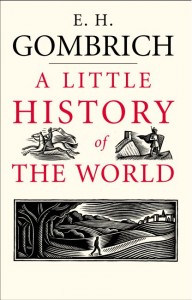 A Little History of the World – E. H. Gombrich
A Little History of the World – E. H. Gombrich
With four boys 8 and under, bedtimes at our house involves plenty of reading. I’m always on the lookout for books that will engage the boys and at the same time give me strength as I face Here is Spot for the twentieth time with the younger ones.
This year I discovered Gombrich’s A Little History of the World. In 1936, Gombrich was asked to write a history of the world for younger readers. He apparently wrote it in six weeks. The result is a rather stunning, attractive and tone-perfect history of civilization. It has my oldest son utterly captivated, and I don’t think I’ve made it through a chapter yet without learning something new myself.
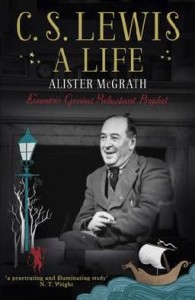 C. S. Lewis—a Life: Eccentric Genius, Reluctant Prophet – Alister McGrath
C. S. Lewis—a Life: Eccentric Genius, Reluctant Prophet – Alister McGrath
2013 marks fifty years since C. S. Lewis died. Someone of McGrath’s profile could have spun off a thin, eulogistic book on Lewis and kept everyone (and especially his publishers) happy. Instead, McGrath has produced a large, painstakingly researched, fresh and original biography of the great literary and Christian figure. Though not uncritical, McGrath’s affection for Lewis shines through in his very sympathetic treatment. It was a delight to spend a lot of time in Lewis this year and to be reminded again of the power of imagination to get behind enemy lines and commend the gospel to a cynical generation. More of that, please!
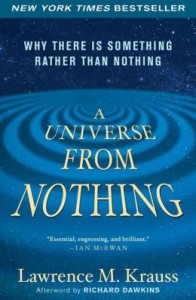 A Universe from Nothing – Lawrence Krauss
A Universe from Nothing – Lawrence Krauss
In 2013, a public engagement with Lawrence Krauss in Perth was the presenting reason for me to stare down my virtual scientific illiteracy and read some science. Philosophically, I’m not sure I buy Krauss’s definition of ‘nothing’ and I don’t think his conclusions have quite the implications for theism that he does, but as a model of energetic, clear, funny and ludic communication of complex scientific ideas to the under-educated (me), it was fantastic. If we could make our theology as exciting and enticing as Krauss makes cosmology, we would be well served.
Blogger Jean Williams:
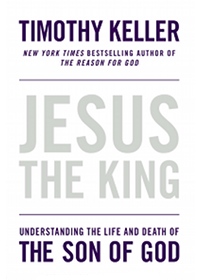 King’s Cross – Tim Keller
King’s Cross – Tim Keller
Every year, I read a book on the cross or God’s character, slowly and prayerfully, week by week, on my mornings off. This year, I enjoyed Tim Keller’s King’s Cross (also called Jesus the King). It bears all the hallmarks of his style: it’s richly written, profoundly wise, culturally engaging, and deals with familiar themes like idolatry and the trinity. Every chapter brought me face-to-face with Jesus, to be moved, challenged and changed by him. This book deserves to become a classic. It will make a great gift for both believers and unbelievers.
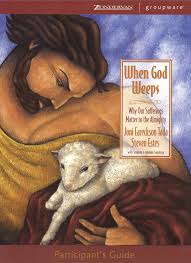 When God Weeps – Joni Eareckson Tada and Steven Estes
When God Weeps – Joni Eareckson Tada and Steven Estes
There’s a point in suffering when you can read books on the topic again. My son has been chronically ill for several years now, and I reached that point about 6 months ago. In the pages of When God Weeps I found wisdom, solace, courage and hope. The writing is colorful and honest, with a blend of Joni’s long experience and Steven’s tight theology (though I didn’t agree at all points). There are terrific reflections on God’s character, avoiding bitterness, and hell. As I read the final chapter on heaven, I found myself in tears. This is the perfect book to give someone going through a time of trial.
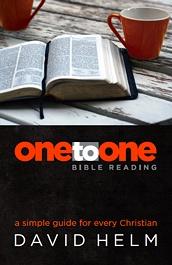 One to One Bible Reading – David Helm
One to One Bible Reading – David Helm
This is a brilliant little book. Only 100 pages long, it’s a top-of-the-list ministry resource. How does God change lives? Through his word. How can we be involved? By reading the Bible with a friend. Who could benefit? Anyone, Christian or non-Christian, mature or new to the faith. It’s that simple; but it can sound intimidating. David Helm first inspires us, and then introduces tools like the Swedish method and COMA, easy-to-use methods that require only an open Bible. I’ve led one training seminar based on this book, and will continue to put it into the hands of those I teach and train.
Open House Book reviewer and Associate Dean of Ridley Marketplace Institute Kara Martin:
 Freedom – Jonathan Franzen
Freedom – Jonathan Franzen
I had heard much about Freedom before I started reading it. Jonathan Franzen’s novel has received wide acclaim. In many ways it is like a rollercoaster ride: strap yourself in and hold on tight. It is witty and harsh, and the plot moves along at breakneck speed.
Franzen attacks a huge topic: the freedoms we enjoy in life, and their impact on others and ourselves.He does this by examining in intimate detail the lives of a reasonably ordinary family: Walter Berglund, an environmentally-conscious guy, married to Patty, a stay-at-home Mum who used to be a basketball star, and their two children, the intelligent Jessica, and the rebellious Joey.
For me, there was a refreshingly Gospel-edged message that emerged from the book: sin has consequences. Society wants the freedom to have sex with people of choice, but doing that will hurt people, it will harden hearts and souls, it will split apart marriages. Society wants the freedom to consume as much as people want, but this inevitably has an impact on the economy and the environment, forcing us into impossible choices. This book is not an easy read, but then the stories of our own lives laid bare are not easy either.
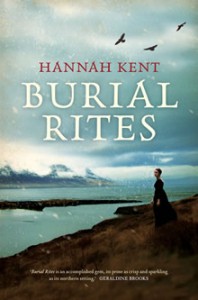 Burial Rites – Hannah Kent
Burial Rites – Hannah Kent
The setting is Iceland in the 1900s, where convicted murderess Agnes Magnusdottir is sent to wait out the time until her execution at the farm of district officer Jon Jonsson, with his wife Margret, and their two daughters. Life is hard and the farm is not doing well, but the meagre financial compensation for minding a convicted killer is little relief for Margret, who is scared for the safety of herself and her daughters. However, Agnes’ presence ends up being a boon to the family. She turns out to be a hard worker, literate and intelligent. She provides remedies to ease the ails of Margret, and helps out with a painful birth.
Most of the story is told in conversation between Agnes and the Assistant Priest, Toti Jonsson, who is sent to prepare her soul for death. Toti at first uses the blunt methods suggested to him: forced biblical recitations, confession and prayers. However, he ends up deciding that his best recourse is “the gentle and enquiring tones of a friend” providing her “with a final audience to her life’s lonely narrative”. This captivating story is a promising first novel for Adelaide-based Hannah Kent. It is based on real events, the last execution in Iceland.
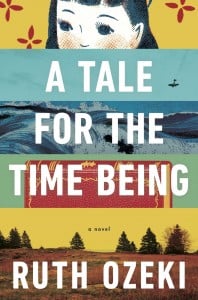 A Tale for the Time Being – Ruth Ozeki
A Tale for the Time Being – Ruth Ozeki
This book is a mystery story with a twist.
A woman finds a diary of a Japanese girl washed up on the sands of the remote US island where she lives with her husband. There is a theory that the book might have been brought from the Japanese tsunami across the oceans. As Ruth reads the diary, she begins to fear for the author, Nao, who seems suicidal, and whose father is suicidal, and whose mother seems detached. The only sane person in her life’s narrative is her Great-Grandmother Jiko, a Buddhist nun.
The author has fun with us in this novel. The woman who finds the diary is called Ruth, and is herself a successful writer struggling with her next book. Like her character, Ozeki has Japanese heritage. There is a moment in the book when the ending could change depending on Ruth’s reading of the diary. In this way it reminds me of some of the narrative tricks in Sweet Tooth by Ian McEwan, who used his own early short stories in his novel. It is an intriguing novel.
Writer for Eternity, Guan Un:
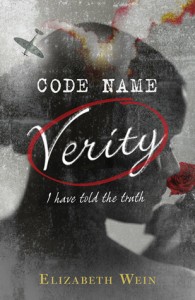 Code Name: Verity – Elizabeth Wein
Code Name: Verity – Elizabeth Wein
If we were going purely by genre, Code Name Verity is not a book that I would have liked: it’s a young adult book with a feisty girl heroine, set during wartime. But genre is only a signpost, and sometimes signposts point you in the wrong direction. All told: Code Name : Verity is a crackerjack of a book. To say much about the plot would spoil the wonderful surprises within, but it begins as the written confession of “Queenie”, a Scottish spy in enemy clutches.
The virtues of this book are manifold: the characters veritably leap off the page, the plot is wound as tight as a spring, and it’s a veritable masterclass in maintaining a rich, distinctive character voice. Code Name: Verity is a story that will stay with you long after you close the cover. My favourite fiction book of the year.
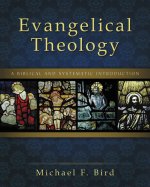
Evangelical Theology – Michael F. Bird
On a very different end of the scale, 2013 saw the release of Evangelical Theology, by lecturer at Ridley College, Dr Michael Bird.
I’m still in the midst of wandering through it—it clocks in at 900+ pages—but it’s a delight to do so. It’s a systematic theology—that is, it aims to bring theology under “systematic” headings—but Bird’s aim at the outset is a systematic that has the gospel not just as its content, but also as its “structure and substance”.
It’s a lofty aim, for sure, but it’s often brilliant, especially with Bird’s deft touch with the width and depth of Christian thought and theology, both past and present. And it helps that it’s a joy to read: the only systematic that I’d be happy to give to a layperson as well as theological reading group. I suspect it will be a classic, and, for patriotic reasons, I’m glad that it’s from our own shores.
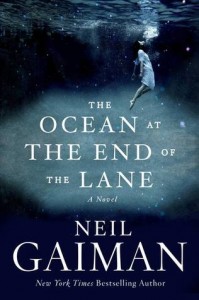 The Ocean at the End of the Lane – Neil Gaiman
The Ocean at the End of the Lane – Neil Gaiman
Neil Gaiman is a modern fantasy author with a hugely devoted following, and The Ocean at the End of the Lane is his latest work. In the past, Gaiman has dealt with the mythic (American Gods) and children’s fantasy (Coraline), and while The Ocean at the End of the Lane continues some of those themes, it could be the loveliest book that he’s done.
It’s a book about memory, childhood, regret and growing up: our unnamed narrator drives from a funeral to his childhood home, and as so often happens,that sight and that place dredges up a vast memory of a childhood friendship and happening which he tells through the rest of the book. Like the ocean of the title, the prose seems almost calm, but often hints at much more beneath the surface, in the way that great novels, and great art, can do.
Blogger, Nathan Campbell
 Writing on the Wall: 2,000 Years of Social Media – Tom Standage
Writing on the Wall: 2,000 Years of Social Media – Tom Standage
Standage explores the history of sharing revolutionary messages through social networks. He kicks off with Cicero, but spends plenty of time providing some interesting insights into the spread of Christianity – including Paul’s revolutionary use of social networks, communication infrastructure (the Roman roads), and the written word, and Luther’s use of the Printing Press. It is a fascinating Gladwellesque read, drawing interesting anecdotes, facts, and analysis together into a coherent framework to tell a story of communication history that has much to teach today’s media consumers – and social media participants – about how messages, like the Gospel, spread from person to person using a variety of mediums.
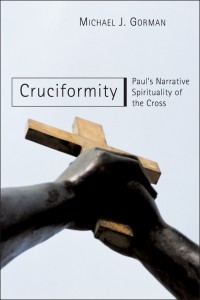 Cruciformity: Paul’s Narrative Spirituality of the Cross – Michael J. Gorman
Cruciformity: Paul’s Narrative Spirituality of the Cross – Michael J. Gorman
This is accessible theological writing, it draws from a measured balance of exegesis, socio-historical reconstruction of the ancient world, literary analysis, and an engaging approach to theology. Gorman’s thesis is that the cross shapes everything for Paul – the way he lives, communicates, and relates to the world around him. It’s worth the price of admission (or the cover price) for the observations he makes about the connections between the incarnation hymn of Philippians 2 and Paul’s description of his approach to ministry in 1 Corinthians 9. Paul’s life and ministry is shaped by the rights renouncing others focused humiliation Jesus endures at the cross, in order to win lost people to God. This is a great book.
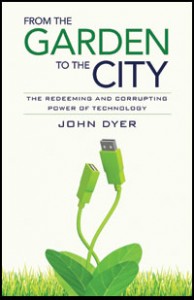 From the Garden to the City: The Redeeming and Corrupting Power of Social Media – John Dyer
From the Garden to the City: The Redeeming and Corrupting Power of Social Media – John Dyer
John Dyer is a media ecologist, and a Christian. Media ecologists think about the power different mediums have on those who use them, and on the messages they carry. Media ecology is a discipline that emerged after Marshall McLuhan declared “the medium is the message,” one of McLuhan’s intellectual descendants described the effect mediums have on their users with the line “we shape our tools, thereafter our tools shape us.” This is true for social media too – Facebook is literally rewiring your brain. It is changing how we communicate. Mediums aren’t neutral. This book is a useful tool for thinking about using modern tools deliberately to create and cultivate in God’s world.
Top image by Abee5 via Flickr, used under CC Licence
Email This Story
Why not send this to a friend?



